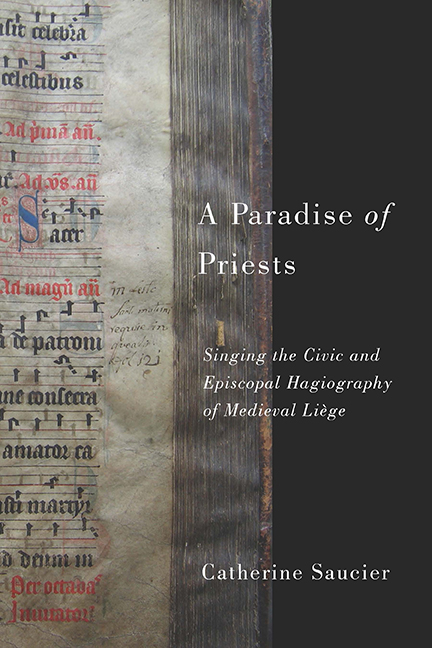Book contents
- Frontmatter
- Dedication
- Contents
- List of Illustrations
- Acknowledgments
- Abbreviations
- Note on Editorial Conventions
- Introduction: The Sound of Civic Sanctity in the Priestly Paradise of Liège
- 1 Martyred Bishops and Civic Origins: Promoting the Clerical City
- 2 The Intersecting Cults of Saints Theodard and Lambert: Validating Bishops as Martyrs
- 3 The Civic Cult of Saint Hubert: Venerating Bishops as Founders
- 4 Clerical Concord, Disharmony, and Polyphony: Commemorating Bishop Notger's City
- 5 Military Triumph, Civic Destruction, and the Changing Face of Saint Lambert's Relics: Invoking the Defensor Patriae
- Conclusion: Hearing Civic Sanctity
- Appendix: Service Books Preserving the Medieval Chant Repertory Sung in the City of Liège
- Notes
- Bibliography
- Index
4 - Clerical Concord, Disharmony, and Polyphony: Commemorating Bishop Notger's City
Published online by Cambridge University Press: 15 March 2018
- Frontmatter
- Dedication
- Contents
- List of Illustrations
- Acknowledgments
- Abbreviations
- Note on Editorial Conventions
- Introduction: The Sound of Civic Sanctity in the Priestly Paradise of Liège
- 1 Martyred Bishops and Civic Origins: Promoting the Clerical City
- 2 The Intersecting Cults of Saints Theodard and Lambert: Validating Bishops as Martyrs
- 3 The Civic Cult of Saint Hubert: Venerating Bishops as Founders
- 4 Clerical Concord, Disharmony, and Polyphony: Commemorating Bishop Notger's City
- 5 Military Triumph, Civic Destruction, and the Changing Face of Saint Lambert's Relics: Invoking the Defensor Patriae
- Conclusion: Hearing Civic Sanctity
- Appendix: Service Books Preserving the Medieval Chant Repertory Sung in the City of Liège
- Notes
- Bibliography
- Index
Summary
The earthly successors to the three saintly founders of Liège—Bishops Theodard, Lambert, and Hubert—oversaw the subsequent growth of this holy terrain into a true ecclesiastical city. Following its birth around the site of Lambert's martyrdom in the early eighth century, Liège witnessed a second period of church construction in the tenth and eleventh centuries resulting from episcopal initiatives. Bishops Richer (920–45), Eraclus (959–71), Notger (972–1008), and Balderic II (1008–18) personally approved the founding of seven collegiate churches—the secular chapters that rendered Liège a veritable city of clerics. These canons enhanced the bishop's power and prestige, supplying a ready pool of administrators from which the prelate could recruit his counselors and men of letters. Yet, ideally, each canon's primary duty was a musical one—to sing the Divine Office. By surrounding the episcopal seat with a sizable clerical population singing and praying on their behalf, bishops at once increased the fervor of civic pleas for divine protection and paved the way for personal salvation. Bishops Richer, Eraclus, and Notger were particularly successful in this respect. Having secured their burial at a collegiate church, these individuals were guaranteed a lasting memory among the chapters of canons commissioned to sing and pray, in perpetuity, for the well-being of their souls.
Of the four bishops who established the city's seven collegiate churches, Notger is beyond a doubt the most preeminent. From Notger's time to the present, historians have repeatedly lauded this prelate's singular civic influence. Notger's role as the “second founder” of Liège, coined in 1905 by the Belgian historian Godefroid Kurth, is rooted in local discourse from as early as the tenth century. Even while Notger was still living, his contemporary, Abbot Folcuin of Lobbes (d. 990), observed, “none of his predecessors … enriched more than him the church of Liège with goods, ennobled it with edifices.” It is with good reason that these writers acknowledged the prelate's superlative status, for, as charters, diplomatic records, and archaeological evidence attest, no other bishop in liégeois history single-handedly built more churches, installed more secular clergy, or contributed more to the city's fortification than Notger.
This bishop's initiatives, however, were not limited to the physical realm of construction. While the city could credit its martyrial origins to three saintly founders, to Notger it owed its clerical identity.
- Type
- Chapter
- Information
- A Paradise of PriestsSinging the Civic and Episcopal Hagiography of Medieval Liège, pp. 137 - 167Publisher: Boydell & BrewerPrint publication year: 2014

